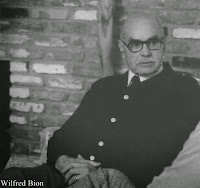The Complete Works of W. R. Bion
The Complete Works of W. R. Bion is now available in a coherent and corrected format. Comprising sixteen volumes bound in green cloth, this edition has been brought together and edited by Chris Mawson with the assistance of Francesca Bion. Incorporating many corrections to previously published works, it also features previously unpublished papers. Including a general index and editorial introductions to all the works, these volumes will be a useful and valuable aid to psychoanalytic scholars and clinicians, and all those interested in studying and making use of Bion's thinking.
Bion's writings, including the previously unpublished papers and additions to his Cogitations, collected together in the Complete Works, show that the clinical thrust of Bion's work has clear lines of continuity with that of Melanie Klein, just as her work has an essential continuity with the later work of Freud. In Bion's clinical work and supervision the goal remains insightful understanding of psychic reality through a disciplined experiencing of the transference and countertransference; the setting and the method - however much Bion's terminology might suggest otherwise - remains rigorously psychoanalytic.
Volume I
The Long Weekend: 1897-1919 (Part of a Life)
Volume II
All My Sins Remembered: Another part of a Life
The Other Side of Genius: Family Letters
Volume III
War Memoirs 1917-1919
Volume IV
The 'War of Nerves' (1940)
On Groups (1943)
The Leaderless Group Project (1946)
Psychiatry at a Time of Crisis (1948)
Group Methods of Treatment (1948)
Language and the Schizophrenic (1955)
Experiences in Groups and Other Papers (1961)
Learning from Experience (1962)
Volume V
Elements of Psycho-Analysis (1963)
Taming Wild Thoughts (I): The Grid (1963)
Transformations: Change from Learning to Growth (1965)
Volume VI
Memory and Desire (1965)
Catastrophic Change (1966)
Second Thoughts: Selected Papers on Psychoanalysis (1967)
Notes on Memory and Desire (1967)
Attention and Interpretation: A Scientific Approach to Insight in Psycho-Analysis and Groups (1970)
Book Reviews (1966)
Volume VII
Brazilian Lectures:
1973 Sao Paulo Lectures
1974 Sao Paulo Lectures
1974 Rio de Janeiro Lectures
Volume VIII
Clinical Seminars:
Brasilia 1975
Contributions to Panel Discussions:
Brasilia, a New Experience (1975)
Sao Paulo (1978)
Bion in New York and Sao Paulo:New York (1977)
Sao Paulo (Ten talks) (1978)
Volume IX
The Tavistock Seminars (June 1976 - March 1979)
The Italian Seminars (1977)
A Paris Seminar (July 1978)
Volume X
Two Papers:
The Grid (1971)
Caesura (1975)
Four Discussions (1976)
Four Papers:
Emotional Turbulence (1976)
On a Quotation from Freud (1976)
Evidence (1976)
Making the Best of a Bad Job (1979)
Interview with Anthony Banet Jnr (1976)
Taming Wild Thoughts (II): Untitled (1977)
Volume XI
Cogitations
Review of Cogitations, by Andre Green
Volume XII
A Memoir of the Future: Book 1
Volume XIII
A Memoir of the Future: Book 2
Volume XIV
A Memoir of the Future: Book 3 (with expanded Key)
Volume XV
Unpublished papers:
The Conception of Man (1961)
Penetrating Silence (1976)
New and Improved (1977)
Further Cogitations (1968-1969)
Appendix A: The Days of Our Lives (1994), by Francesca Bion
Appendix B: 'Catastrophic Change' and 'Container and Contained Transformed': a comparison, by Chris Mawson
Appendix C: Standardized Bibliography of Bion's Works, compiled by Harry Karnac
Volume XVI
References
General Index
Wilfred Ruprecht Bion DSO (8 September 1897 - 8 November 1979) was a British psychoanalyst. Bion was born in India in the days of the British Raj, and was sent to school in England at the age of eight. He left school just before he was eighteen to join the Tank Corps and served in France where he was awarded the DSO, the Legion of Honour, and was mentioned in dispatches. After the war he read History at the Queen's College, Oxford, studied medicine at University College, London, and then turned to psycho-analysis to which he devoted the remaining fifty years of his life, the last twelve being spent in California.
A pioneer in group dynamics, he was associated with the 'Tavistock group', the group of pioneering psychologists that founded the Tavistock Institute in 1946 on the basis of their shared wartime experiences. He later wrote the influential Experiences in Groups, in 1961, an important guide for the group psychotherapy and encounter group movements beginning in the 1960s, and which quickly became a touchstone work for applications of group theory in a wide variety of fields.
Abandoning his work in the field of group psychotherapy in favor of psychoanalytic practice, he subsequently rose to the position of Director of the London Clinic of Psycho-Analysis (1956-62) and President of the British Psycho-Analytical Society (1962-65). From 1968 he worked In Los Angeles, returning to England two months before his death in 1979.
Bion's training included an analysis with Melanie Klein and he was was a potent and original contributor to psychoanalysis. He was one of the first to analyse patients in psychotic states using an unmodified analytic technique; he extended existing theories of projective processes and developed new conceptual tools. The degree of collaboration between Hanna Segal, Wilfred Bion and Herbert Rosenfeld in their work with psychotic patients during the late 1950s, and their discussions with Melanie Klein at the time, means that it is not always possible to distinguish their exact individual contributions to the developing theory of splitting, projective identification, unconscious phantasy and the use of countertransference. These three pioneering analysts not only sustained Klein's clinical and theoretical approach, but deepened and expanded it, and his work continues to be found clinically relevant today, in the UK, North and South America, and across the world.
His writings include Learning From Experience (1962), Elements of Psychoanalysis (1963), Transformations (1965), Attention and Interpretation (1970), Two Papers: The Grid and Caesura (1977) and two posthumously published volumes of autobiography: The Long Weekend (1982) and All My Sins Remembered (1985).
 |
| Bartleby, the Scrivener: “I would prefer not to.” |



